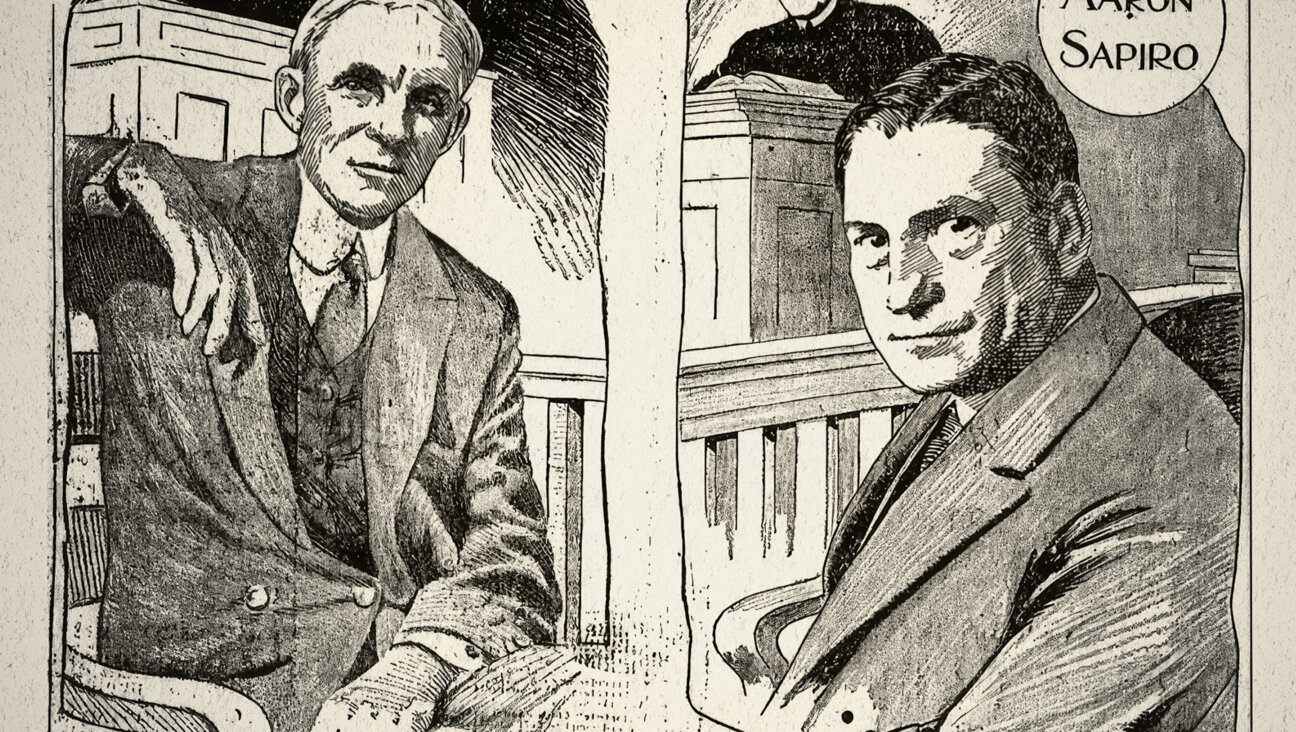From ‘Wanderers’ by Richard Stern
Each month, in coordination with our reading series in New York, the Forward publishes an excerpt from the work of that month’s series guest or guests. This month, we will feature readings by Richard Stern and Daniel Stolar (for full details, please see sidebar), and the excerpt we have chosen to highlight is from “Wanderers,” a short story included in Stern’s new collection, “From Almonds to Zhoof” (Northwestern University Press). For more information, please visit the new section of our Web site, www.forward.com/noveljews.
‘Those Jews sure did travel.” Miss Swindleman reflecting as the bellhops carried away her glowing collection, the four hundred and fifty postcards which memorialized the wanderings of Hotel Winthrop guests for a quarter of a century. A wild shuffle through the world Miss Swindleman herself knew not otherwise. Unless one counted the scenic provision of a quadri-annual locomotive between New York City, her place of permanent exile, and Synod, Missouri, her detested point of origin. Some provision. The green pudding of southern Ohio, the hoarse red gullet of southern Indiana, and that scab of ambitious hummocks called the Ozarks. One week there with the surviving Swindlemans and she was ready for another four years of New York.
Though less and less ready, thanks to the Jews. When she’d first come, the Winthrop and the Depression were as new as she; they broke into the New York world together. The clientele was quiet: widows, widowers, bachelors, spinsters, a few small families, the ex-rich learning to adjust their wants to their constricted means as she learned to adjust hers to the constrictions of New York loneliness. A quiet, respectable, learning time.
Then as the Depression slid away, and the quiet goyim died, the Jews began moving in. They too were bachelors, spinsters, widows, widowers, and small families, but they had not been broken by hard times. Decades of finagling, deception, complaints, and theft had hardened and renewed them. Behind the three bronze staves of her cashier’s den, she regarded their great noses twitch with the strain of hoping that she would overlook the delinquent quarters in their monthly settlements. She never did, but the strain of guardianship showed in her face.
The Winthrop too showed strain: the rotting plaster showed it, the bursting water pipes, the splintering toilet seats, the ripping carpets. And the management! No more the quiet little Jew, Oppenheim, who’d moseyed noiselessly in the corridors her first twelve years and then, fifty if he was a day, and weak as the cocktails the surviving goyim drank in the Peacock Room at five o’clock — shoring their ghetto within the ghetto — he was drafted away in ’45 to be replaced by a perfect 4-F, the hunchback and supreme yeller, Nagel, a dark Jew, oily, welching, eavesdropping, and mean eyed as the skua bird Dr. Mochus had mailed her ten years ago from the Faroe Islands. Board 6.
With the onset of the Jews, though, Miss Swindleman had conceived her life’s mission: their assimilation. Assimilation to the ways and manners of the older stock which she represented and which gave names to the invaded hotels of Eighty-sixth Street, the Peter Stuyvesant, the Governor Brewster, the Dorchester Arms, the Winthrop. Every check she eyed, every sum she re-added, contributed to their education, to the enforcement of the rules of Western life, rules to which no amount of traveling could educate them.
They were great travelers. Great postcard senders. She’d started her collection one day after Roosevelt beat Landon, when they’d sent her three postcards from three different continents. Board 1 had gone up, and the Jews traveled to fill it. Over the years, war or no war, the boards filled with twisted, six-word cards form Sfax and Borneo, Tarsus, Rhodes, Rio, and Auckland. The fjords ran a blue storm down board 3; the statuary of board 5 made up a great museum; and board 2 carried enough exotic, mean-eyed animals — they loved killers — to stock a Bronx Zoo. If she’d used “repeats,” the Taj Mahals alone could have replaced the slums of New York, but the eye which spotted the delinquent fifteen cents in Milton L. Bungalow’s monthly was ruthless about filtering repetition from the world’s views and could spot a repeat bend of the Trondheim fjord more quickly than a native. There were few places on the traveled earth to which Miss Swindleman lacked some sort of key. Even the Arab countries were well represented. Not only had the Jews traveled there before the war, but the Winthrop’s few voyaging goyim liked to visit there, if only to flaunt the experience before the excluded yehudim.
Miss Swindleman understood the desire to flaunt experience before these wanderers. Experience was a fact, like family, like money, which had to be respected. Not that it marked superiority. Miss Swindleman didn’t believe in superiority. There were only greater or lesser collections of fact. She was concerned with the arrangement of the few facts under her control, because that was the human task, to fend off the disorderly, the ugly, the crooked. It was why she never turned her back on a Jew when she was in her den. “Get thee before me, Israel, I’ll keep thee orderly.” And she surveyed their avaricious disorder through the peeling bronze staves which never vouchsafed them more than partial views of her.
It was why she classified her own partial views, those nickel four-by-sixes, classified them by area, type, color — the blue fjords, the checkerboards of Scotland, highland, lowland. They were not an altar, but a demonstration that the world would be put into shape and, too, that there were things beyond unsteady checks, paid-up phone bills, change for a clanked quarter thrown like an insult under her staves. Stability and place were there amid the wild shuffling, amid the packed suitcases, the scarred trunks, the taxis to Pier 40.
Miss Swindleman could spot traveler types as they signed the register. They signed both easily and wearily. Half the few couples who stayed in the Winthrop traveled; about a third of the widows, three-eighths of the widowers. Under forty didn’t count. She’d probably not received more than ten cards from guests under forty, usually children who had lived with widowed parents (not more than twenty regulars in her more than thirty years). She once got a Blenheim Palace from a pockmarked Mettenleiter and had discarded a repeat of Sugarloaf Mountain from a Baer twin, but that was all of the memorable.
Nothing of course from the two boys of Harvey Mendel, though they had lived in the Winthrop for fifteen years. She was the only person in the hotel — probably including Mendel — who remembered their mother. Ina Mendel, a name like a sigh, a nice Jewish woman who talked to her in a fluty little voice. No traveler, but nonetheless had once bought her a postcard of the Roman Forum before being told that only mailed postcards were pasted up. Ina took plenty from Mendel and the two nut sons. The worst was Sonny, who, at fourteen, was nearly arrested for lowering an armchair out of the eleventh story to an accomplice on the ground in full view of Eighty-sixth Street. He’d been hauled in to Nagel by Lester, the cabbie, who looked up from examining one of the pigeons he liked to grab by the throat and pick at with his penknife. Last year, Sonny, now known as Harvey, had proved his early promise by being jailed for three months in Phoenix, Arizona, on a charge of taking pornographic pictures. The lesser nut was Burton, the railroad buff, who spent hours in the lobby memorizing the timetables but couldn’t figure out change for a quarter. Ina lasted six years, then went on the operating table to be knifed to death by some Lester of a surgeon. With her passing, and Oppenheim’s, the reign of half-decent Jews ended, and the Mendel type took over.
They were too mean spirited even to travel, too cheap to live. Once she’d called him the monk of Eighty-sixth Street. “Are you related to Gregor Mendel, the monk?” she asked him.
He never smiled. Baby lips in a cranium the size of a great soup bowl. Between it and abnormality — water on the brain — was scarcely a hair’s breadth of dispute. “What monk?”
“Invented genes,” said Miss Swindleman.
“A monk in skirts invents jeans. Crazy,” said Mendel.














